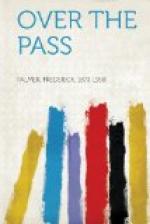“We have always been as strangers, father,” he began. “I have no recollection of you in childhood until that day you came as a stranger to the house at Versailles. I was seven, then. My mother was away, as you will recall. I remember that you did not kiss me or show any affection. You did not even say who you were. You looked me over, and I was very frail. I saw that I did not please you; and I did not like you. In my childish perversity I would speak only French to you, which you did not understand. When my mother came home, do you remember her look? I do. She went white as chalk and trembled. I was frightened with the thought that she was going to die. It was a little while before she spoke and when she did speak she was like stone. She asked you what you wanted, as if you were an intruder. You said: ‘I have been looking at the boy!’ Your expression told me again that you were not pleased with me. Without another word you departed. I can still hear your steps on the walk as you went away; they were so very firm.”
“Yes, Jack, I can never forget.” The tone was that of a man racked. “What else?” he asked. “Go on, Jack!”
“You know the life my mother and I led, study and play together. And that was the only time you saw me until I was fourteen. I was mortally in awe of you then and in awe of you the day I went West with your message to get strong. But I got strong; yes, strong, father!”
“Yes, Jack,” said the father. “Yes, Jack, leave nothing unsaid—nothing!”
Now Jack swept back to the villa garden in Florence, the day of the Doge’s call; and from there to the Doge’s glance of recognition that first night in Little Rivers; then to the scene in front of the bookstore, when the Doge hesitated about going to see the Velasquez. He pictured the Doge’s absorption over the mother’s portrait; he repeated Mary’s story on the previous evening.
All the while the profile, so dimly outlined in the outer darkness beyond the lamp’s circle of light, to which he had been speaking, had not stirred. The father’s cigar had gone out. It lay idly in his fingers, which rested on the arm of the chair, above a tiny pile of ashes on the rug. But there was no other sign of emotion, except his half affirmative interjections, with a confessional’s encouragement to empty the mind of its every affliction.
“Why were my mother and myself always in exile? What was this barrier between you and her? Why was it that I never saw you? Why this bitterness of Jasper Ewold against you? Why should that bitterness be turned against me? I want to know, father, so that we can start afresh and right. I no longer want to be in the dark, with its mystery, but in the light, where I can grapple with the truth!”
There was no rancor, no crashing of sentences; only high tension in the finality of an inquiry in which hope and fear rose together.




